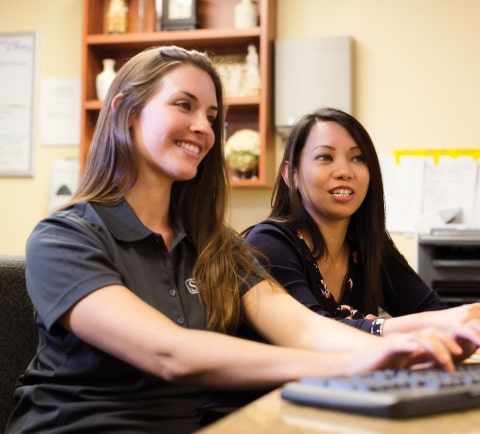Silverado Research Studies
Silverado is in a unique position to help researchers in their quest to rid the world of Alzheimer’s and other types of dementia, so we partner with leading organizations to help make the discoveries that may someday provide the next great treatment or cure.
2010
- Stanford University School of Medicine is involved with Silverado in a clinical study to investigates new brain imaging compound.
Lead by Dr. Natalie Rasgon, research may lead to earlier and more accurate detection of Alzheimer’s Disease and Dementia with Lewy Bodies. - University of California, San Francisco participates in a study with Silverado on proxy decision makers for Alzheimer’s Disease research. The study, lead by Dr. Laura Dunn, is being done to better understand how caregivers or proxy decision-makers think about research studies in the hopes of improving the way researchers communicate results. Click to read more
- Stanford University and VA Aging & Research Center is involved with Silverado in a clinical study on Citalopram for agitation in people with Alzheimer’s disease. The goal of the study is to learn if Citalopram is helpful to people with Alzheimer’s disease who are experiencing significant symptoms of agitation.
- Stanford University study by professor Jerome Yesavage, MD hopes to work with Silverado Residents for a study on sleep and dementia. Professor Yesavage is and Chief of staff for VA mental health and Directs the Stanford Aging Research Center. Recruitment for this study is ongoing. (Updates will be made as the study progresses)
2009
- Silverado Calabasas – University of California Los Angeles study, Dr Lene Levy-Storms re. “Therapeutic Communication During Care.” Dr. Levy-Storms’ research concerns communication issues between health care providers and patients and ways to make improvements.
- University of California, Irvine / Department of Justice, Dr. Laura Mosqueda, Dr. Kerry Burnight, Dr. Solomon Liao study of Normal Bruising in AL Dementia Residents – Silverado Tustin Hacienda, San Juan Capistrano and Newport Mesa. The goal of this study is to systematically document accidental occurring bruising in older adults to provide a foundation for comparison when considering suspicious bruising. The aim of this study is to summarize the occurrence, progression, and resolution of accidentally inflicted bruising in a sample of older adults to hopefully improve safety standards.
2008
- University of California, Los Angeles, Gastroenteritis study Silverado Senior Living – Calabasas. This study examines the Gastroenteritis in seniors.
- University of California San Diego, Silverado Senior Living – Encinitas study with Dr. Daly, Dr. Sewell. “Impact of Acetylcholinesterase Inhibitors with Later Stage Dementia.”
- University of California, San Diego (UCSD): “Metabolic Effect of Newer Antipsychotics in Older Patients” study with Drs. Jeste/Naimark. Silverado Senior Living – Escondido. The purpose of this study is to compare the risk of Metabolic, Cardiovascular and Cerebrovascular Effects (MCCE) with 4 atypical antipsychotics (aripiprazole, olanzapine, quetiapine & risperidone) using both clinical and laboratory assessments. Additionally, exploring the risk factors (e.g., age, ethnicity, baseline obesity) and potential mechanisms (e.g., altered insulin sensitivity, increased adiposity, vascular inflammation and endothelial dysfunction) were explored. Finally, the effect of the MCCE on everyday functioning and health-related quality of life were evaluated. Click to read more
- University of Northern Texas Study with Dr. Hayslip. “Mental Aerobics” Published in Educational Gerontology, Volume 25, Issue 1 February 1999 , pages 1 – 12 Silverado Senior Living – Plano.Abstract Mental aerobics is a program designed to enhance the self-esteem and cognitive functioning of older adults in the context of weekly group sessions where the emphasis is on having fun, the cooperative sharing of ideas, and the development of solutions to challenging problems. Loosely based on the creative thinking concepts of the Odyssey of the Mind program, the counselor/facilitator brings to the group puzzles, logical and matrices problems, and both math and word problems to be solved. Older persons who may no longer believe they can produce creative answers and solve such problems are encouraged to believe in themselves by their own successful performance. The program is quite adaptable, and its format can be changed to fit a variety of settings to include intergenerational ones.
- University of Southern California assessing Socially Assistive Robotics. Dr.’s Mataric/Tapus “Assessing Socially Assistive Robotics (SAR) as Social and Cognitive Aides for Elderly.” The Huntington, Sierra Vista, Tustin Hacienda, January 1, 2008 – This study is about understanding the effects of how a hands-off therapist robot may improve cognitive abilities by assisting, encouraging, motivating and socially interacting with participants. The robot is about 3 feet tall. The main goal of this research is to create an engaging and motivating customized program for users suffering from cognitive changes related to aging and/or Alzheimer’s disease to use in a laboratory setting and ultimately in their home.
2005 and earlier
- 2005 “Double-blind Study of an Investigational Drug to Decrease Amyloid Plaques” Dr. Steven Potkin. This study was of an investigational treatment to decrease the amyloid plaques in brains of people with Alzheimer’s disease. This treatment was administered intravenously and blood levels were measured of various markers of amyloid formation. The study was conducted for 5 months and discontinued due to inconclusive results. Click to read more
- Radiant Research / Dr. Thein, Dr. Crusey. Silverado Senior Living – Escondido. Phase II double blind, randomized, placebo-controlled clinical trial of medication for patients with mild to moderate Alzheimers diagnosis. – Dr. Thein, Dr. Crusey / Radiant Research. Click to read more.
- University of California, San Diego: Frontal-Temporal dementia research. Silverado Senior Living – Encinitas. Proposed by Dr. Daly with University of California San Diego Alzheimer’s Research Center of California on frontal-temporal dementia.
- Baylor College of Medicine conducting Aricept Study. Sugar Land, The Woodlands. One resident on Aricept study.
- University of California San Diego study, Dr. Sonia Ancoli-Isreal re. “The Effects of Natural Light on Person’s with Dementia.” This study observed residents who were asked to sit in front of a high intensity light box every day for an accumulated time of 2 hours. During these times, the interviewer might talk or play a game with the resident. Each day, changes in the resident’s behavior throughout the day and night were recorded. Bed times and sleep periods were recorded also. Visit here for details on the Light Study


